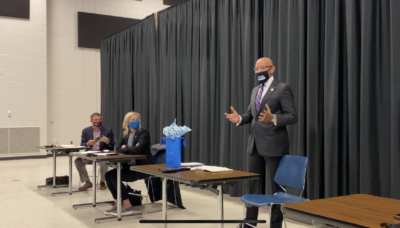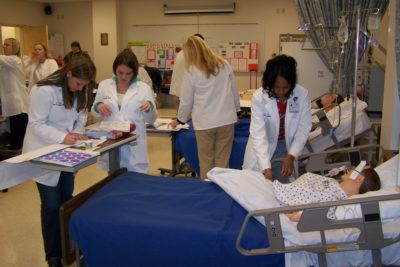The State Board of Community Colleges met March 19th to discuss progress on the community college system’s legislative priorities, personnel changes, and budget accommodations around “the COVID year.”
Roanoke-Chowan presidential search
The Board announced the hiring of Dr. Murray Jean Williams as president of Roanoke-Chowan Community College. Dr. Williams was previously the vice president of adult education and academic support for Southern Crescent Technical College in Griffin, Georgia.
The board of trustees at Roanoke-Chowan Community College sent the names of two finalists to the Board’s Personnel committee, which decided on Dr. Williams. The recommendation was approved unanimously by the full Board.
“COVID year” FTE exception
The Board approved a 2021 Budget Provision Request that included two action items. One of the system’s top legislative priorities is a request for $61 million in non-recurring funding to help stabilize colleges’ budgets due to pandemic-related enrollment losses this year. The system is now requesting that these budget stabilization funds, if appropriated by the legislature, remain available through June 2023.
“This is very in line with what was done with the hurricane funds for the disaster funds there to provide a little more flexibility to the fact that the pandemic uncertainty is still kind of out there,” said Alex Fagg, director of government relations for the system office.
Second, the system requests that the 2020-21 academic year — referred to by Board members as “the COVID year” — be excluded from the two-year budget calculation for colleges who experienced enrollment decline.
“The second one is to essentially skip the COVID year, if there was a decline at the college enrollment, or a college FTE, for the two-year calculation so that college would use the 19-20 and 21-22 to develop that two-year FTE calculation,” he said.
State funding is allocated to community colleges based on their enrollment the previous two years. During a recession, community college enrollment typically increases. But due to the uneven impact of COVID-19 and the nature of online courses, nearly all of North Carolina’s community colleges have experienced enrollment declines this year. Systemwide, community colleges experienced an 11% enrollment decline in fall 2020 compared to fall 2019.
Sign up for Awake58, our newsletter on all things community college.
Exempt employee status
The Board approved a motion to designate some system office staff as “exempt” employees.
“One category is what we call SPA, which is subject to the State Human Resources Act. The other category is EPA, which stands for exempt from the Personnel Act,” said Jonathan Harris, chief of staff for the system office. “The exempt folks in the system office, they are nominated by the president to the State Board, and the State Board ultimately approves the hiring of EPA staff. SPA are not brought before the Board, and they are hired here internally at the system office.”
Employees falling under exempt status are “at-will” employees and serve at the pleasure of the system president. This change affects positions in the system’s communications office, switching their status from SPA to exempt.
“The reason for that is the system president and I believe that our communications folks are the representatives of the system office and the community college system,” Harris said. “We are putting out either press releases statements, social media marketing, branding type materials, and we feel if there is a change in direction that’s needed in our communications area, that would allow us to make that change relatively quickly.”
Presidents’ Association report
Dr. Kandi Deitemeyer, president of Central Piedmont Community College, gave a report on behalf of the Presidents’ Association outlining the need for in-person learning as they plan for summer and fall terms.
“Many of our students need to be on campus,” she said. “They need to be in areas where they’re supported outside of the classroom. They need to be engaged in those supportive learning environments. And also, many of them need that sense of community, and that’s what your local community college does.”
Deitemeyer said they are considering a need for programs to address learning loss due to the nature of courses during the pandemic.
“We do anticipate we will see our students return, but we anticipate many adult learners and others who will need to rescale, retrain, or maybe who have just decided after this year, working at home or perhaps not working, that they need a new career,” she said. “They need to re-advantage themselves, and their local community college, as you know, will be the place for them to land.”
The Board will next meet on April 15 and 16. Subscribe to Awake58 for more State Board of Community Colleges coverage.
Recommended reading



